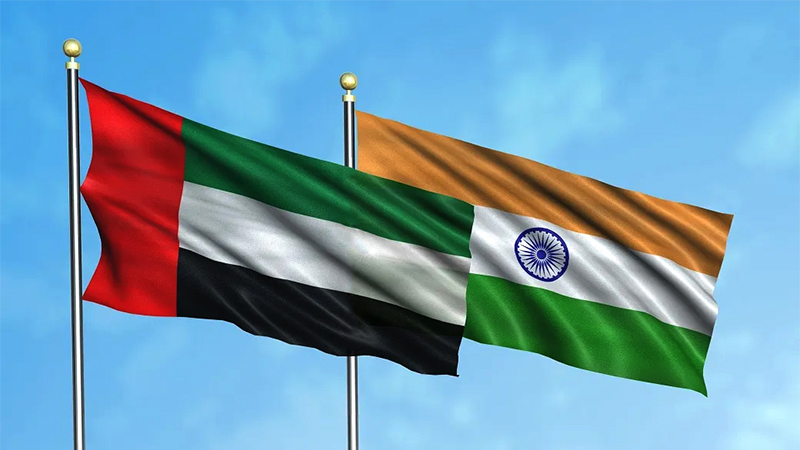India’s growing ties with the Gulf nations could well be one of the defining legacies of Indian Prime Minister Narendra Modi. A decade ago no one could have predicted the manner in which India and the Gulf nations (especially the United Arab Emirates (UAE), Saudi Arabia and Oman), would transform this relationship. The UAE, in particular, has been one bilateral relationship which has seen a very positive trajectory over the last few years and Modi’s visit to UAE on Feb 13 and 14 is yet another indication of the same.
It is also significant to note here that the visits at the highest political level between India and the UAE have been quite frequent, with UAE President Mohamed bin Zayed (MBZ) visiting India in January this year as the chief guest at the Vibrant Gujarat Summit and Modi travelling to Dubai last Dec to attend the COP28 Climate Summit. It is expected that during Modi’s visit both countries will sign the Bilateral Investment Treaty (BIT), which will bring the Indian and the UAE economies closer. This treaty will be in addition to the CEPA Agreement which was signed in Feb 2022.
The Indian PM Modi’s visit to the UAE on Tuesday will be marked by three major public events. He is set to address the World Government Summit (WGS) in Dubai as the “guest of honour” on February 14. This will be the second time Modi has been invited to speak at this summit, the first being in 2018.
Modi’s second major public event will be the address to the diaspora at the Ahlan (Hello) Modi event in Abu Dhabi on February 13. The Zayed Sports City Stadium will host the event and going by the reports coming out of Abu Dhabi, this is likely to be one of the largest diaspora events which Modi has ever addressed.
An outreach to the Indian diaspora has been a hallmark Modi foreign policy initiative. In almost all the countries where he has traveled in the last decade or so, as PM, from the United States to Australia, Modi has met and interacted with the people of Indian origin living and working in those countries. In the UAE, his outreach has great significance. The UAE is home today to a substantial Indian diaspora, numbering 3.8 million, making it one of the largest overseas Indian communities globally.
Hence Modi’s address to the diaspora is also an address to people back home in India, about his vision of bringing all Indians closer, irrespective of where they work and live. Modi has repeatedly pointed out the role of Indians abroad, who have brought laurels to the country.
On February 14, Modi will inaugurate the UAE’s first traditional stone temple, the BAPS Hindu Mandir in Abu Dhabi. The fact that the land for the temple was given by the UAE government in 2015 is another important highlight here. For Modi, the temple inauguration is his way of connecting with the Indian diaspora nd also making the point that all Hindus, whether living in India or abroad, are connected by their common values.
The UAE is an Islamic nation but this is a significant gesture by the UAE where it is welcoming people of Indian descent to stay connected with their religion and beliefs. The temple inauguration is a joint testament by both India and the UAE to their commitment to interfaith harmony and belief that nations with different religions can accommodate the other and share a warm relationship.
The India-UAE partnership, to any observer of international relations, has also moved out of the narrow sphere of energy demand and supply. It has now diversified to joint cooperation in many other sectors, the most significant being defense and security. It should also be noted here that this growth in ties has continued even while the Middle East region is witnessing one of the worst spikes in the Palestine-Israel conflict. The credit for this goes to both India and the UAE which have shown mature diplomacy in handling their bilateral ties on one side while maintaining their respective positions on the ongoing conflict in Gaza.
In January, the UAE also joined BRICS (Brazil, Russia, India, China and South Africa). India and the UAE are part of the I2U2 quadrilateral forum which also includes Israel and the United States. The presence of both India and the UAE in many of these multilateral forums is then another opportunity for them to jointly form policy and direction on the global stage. The UAE was also invited by India as a Special Guest at the G20 Summit that New Delhi hosted in 2023.
Modi’s visit will be watched closely, because apart from the optics, this signals a growing and strengthening of ties which both countries and leaders seem keen
to take forward. In India’s upcoming general elections, most political analysts bet on Modi getting a third successive term as PM. With political stability in India,
UAE and India ties are set for closer cooperation in the coming years. It would not be wrong to say that this will be one of the most significant bilateral relationships of the future which will bring India and the Middle East in a closer embrace. – The writer is Executive Editor of Nrifocus.com


Leave a Reply